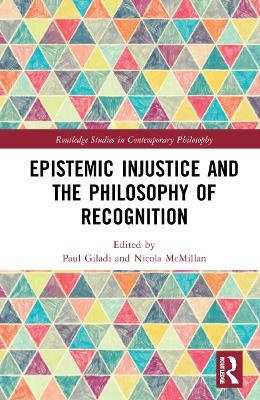
Epistemic Injustice and the Philosophy of Recognition
Routledge (Verlag)
978-1-138-35171-4 (ISBN)
This volume includes original essays that examine the underexplored relationship between recognition theory and key developments in critical social epistemology. Its aims are to explore how far certain kinds of epistemic injustice, epistemic oppression, and types of ignorance can be understood as distorted varieties of recognition and to determine whether contemporary work on epistemic injustice and critical social epistemology more generally have significant continuities with theories of recognition in the Frankfurt School tradition. Part I of the book focuses on bringing recognition theory and critical social epistemology into direct conversation. Part II is devoted to analysing a range of case studies that are evocative of contemporary social struggles.
The essays in this volume propose answers to a number of thought-provoking questions at the intersection of these two robust philosophical subfields, such as the following: how well can different types of epistemic injustice be understood as types of recognition abuses? How useful is it to approach different forms of social oppression as recognition injustices and/or as involving epistemic injustice? What limitations do we discover in either or both recognition theory and the ever-expanding literature on epistemic injustice when we put them into conversation with each other? How does the conjunction of these two accounts bear on specific domains, such as questions of silencing?
Epistemic Injustice and the Philosophy of Recognition heralds new directions for future research that will appeal to scholars and students working in critical social epistemology, social and political theory, continental philosophy, and a wide range of critical social theories.
Paul Giladi is a Senior Lecturer in Philosophy at Manchester Metropolitan University, where he is on the Steering Group of the Research Network for the Study of Race and Racism. He is also the co-director of the Naturalism, Modernity, and Civilization International Research Network. Giladi has published numerous articles in leading philosophy journals and edited collections on Hegel, pragmatism, critical social theory, feminism, and contemporary Anglo-American philosophy. He is also the editor of Responses to Naturalism: Critical Perspectives from Idealism and Pragmatism (Routledge, 2019) and the editor of Hegel and the Frankfurt School (Routledge, 2020). Nicola McMillan was awarded her PhD in philosophy at the University of Lancaster in 2017. Her thesis was awarded the 2018 Political Studies Association Sir Ernest Barker Prize for political theory. She co-edited a 2018 special issue of Feminist Philosophy Quarterly with Paul Giladi on epistemic injustice and recognition theory. McMillan now works for the National Institute of Health Research in the United Kingdom, where she currently manages Join Dementia Research, a service that supports the UK public in volunteering for dementia and brain health research.
Preface, Lucius Turner Outlaw Jr.
Introduction, Nicola McMillan
Part I: Recognition Theory and Critical Social Epistemology in Conversation
Axel Honneth, Two Interpretations of Social Disrespect: A Comparison Between Epistemic and Moral Recognition
Danielle Petherbridge, A Fourth Order of Recognition? Accounting for Epistemic Injustice in Recognition Theory
Cynthia R. Nielsen & David Utsler, Gadamer, Fricker, and Honneth: Testimonial Injustice, Prejudice, and Social Esteem
Lois McNay, Recognising Disempowerment: Taking the ‘Merely Experienced’ Seriously
Kelly Oliver, Gaslighting: Pathologies of Recognition and the Colonisation of Psychic Space
Paul Giladi, Epistemic Exploitation and Ideological Recognition
Ezgi Sertler, Calling Recognition Bluffs: Structural Epistemic Injustice and Administrative Violence
Mari Mikkola, Ideal Theory, Epistemologies of Ignorance, and (Mis)Recognition
Part II: Making Sense of Contemporary Social-Epistemic Struggles
Katherine O’Donnell, Commission to Inquire into Ireland’s Mother & Baby Homes: An Epistemology of Ignorance
Rebecca Tsosie, Constitutional Law and Epistemic Injustice: Hate Speech, Stereotyping, and Recognition Harm
Debra L. Jackson, Male Sexual Victimisation, Failures of Recognition, and Epistemic Injustice
Lauren Freeman & Heather Stewart, The Problem of Recognition, Erasure, and Epistemic Injustice in Medicine: Harms to Transgender and Gender Non-Binary Patients – Why We Should Be Worried
Wendy Carlton & Katrina Hutchison, Epistemic Injustice and Misrecognition in the Sphere of Work: The Case of Women in Surgery
| Erscheinungsdatum | 20.09.2021 |
|---|---|
| Reihe/Serie | Routledge Studies in Contemporary Philosophy |
| Zusatzinfo | 1 Tables, black and white; 6 Halftones, black and white; 6 Illustrations, black and white |
| Verlagsort | London |
| Sprache | englisch |
| Maße | 152 x 229 mm |
| Gewicht | 453 g |
| Themenwelt | Geisteswissenschaften ► Geschichte |
| Geisteswissenschaften ► Philosophie ► Erkenntnistheorie / Wissenschaftstheorie | |
| Sozialwissenschaften ► Politik / Verwaltung ► Politische Theorie | |
| Sozialwissenschaften ► Soziologie ► Gender Studies | |
| ISBN-10 | 1-138-35171-7 / 1138351717 |
| ISBN-13 | 978-1-138-35171-4 / 9781138351714 |
| Zustand | Neuware |
| Haben Sie eine Frage zum Produkt? |
aus dem Bereich


